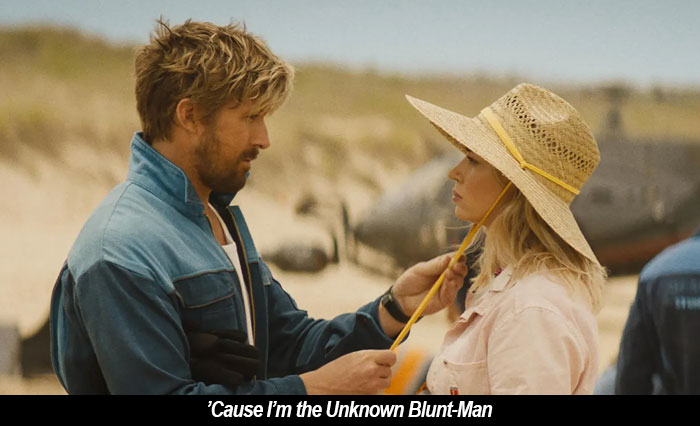The Fall Guy (2024)
**/****
starring Ryan Gosling, Emily Blunt, Aaron Taylor-Johnson, Hannah Waddingham
written by Drew Pearce
directed by David Leitch
by Walter Chaw I watched David Leitch’s The Fall Guy the same way I try to spot a particularly well-camouflaged insect in a terrarium: with a little disgust, a little fascination, a little fear of the uncanny. You know when you know something’s there but you can’t see it? Could be the terrarium keepers are playing a trick, though, right? Could be there’s just a stick in there. By all accounts, real people made and executed The Fall Guy, but who can tell these days without some kind of Voight-Kampff detector? The film is ostensibly based on the classic five-season run of a Lee Majors television show I watched religiously as a kid, though I only retained the theme song (“Unknown Stuntman,” performed by Majors himself), so naturally, I rewatched the entire first season of it to rekindle my crush on Heather Thomas and confirm there’s no real connection between it and the film. The movie does seem to share some elements with Richard Rush’s cult classic The Stunt Man (1980), but it eschews the naked paranoia and strident social commentary. It shares some cosmetic elements with Robert Mandel’s F/X (1986) and its underestimated sequel (F/X 2 (1991)), too. Ultimately, the best analogue in terms of how weird it feels is John McTiernan’s meta-movie Last Action Hero (1993), only without the relative cleverness of a concept higher than “stuntmen do stunts.”


![Night Swim (2024) [Collector’s Edition] – Blu-ray + DVD](https://filmfreakcentral.net/wp-content/uploads/2024/04/vlcsnap-2024-04-19-21h34m55s993-1024x429.png)
